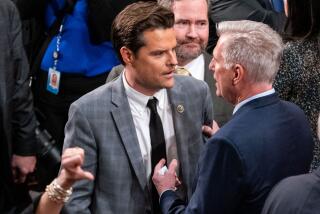McCain Leaves Stamp on Tobacco Deal
- Share via
WASHINGTON — It’s midmorning in downtown Washington but Sen. John McCain is already running late. Behind the wheel of his red Cadillac, the former Navy fighter pilot abruptly makes a tire-screeching U-turn in the middle of 14th Street as three passengers lurch to one side, sucking in their breaths.
Clearly a man in a hurry, the Arizona Republican can veer off in unpredictable directions in the political arena as well.
One of them will be on display today, as McCain presides over a Senate Commerce Committee session on a major tobacco bill he helped negotiate behind closed doors.
With the public health community pulling one direction and the tobacco industry tugging in the other, McCain has taken up what seems like a nearly hopeless cause--one that requires all the endurance and optimism he summoned during five years of captivity as a prisoner of war in Hanoi during the Vietnam War.
But unabashedly championing unpopular issues is nothing new for McCain.
Much to his colleagues’ annoyance, the second-term senator has crusaded against pork-barrel spending and for campaign finance reform. He also led a drive that banned most gifts to senators.
But now, less than a month after taking on the tobacco controversy at the request of GOP leaders, McCain has begun shedding his role as a rabble-rousing outsider.
He looks comfortable wearing the mantle of a power broker with a list of big things to do--including a potential bid for the GOP presidential nomination in 2000.
“I’m still the iconoclast,” McCain said Tuesday as aides bustled in and out of his office with tobacco-related business. “But at the same time I’m also working more in a result-oriented fashion.”
“He’s motivated by a genuine desire to try to solve the country’s problems,” said Sen. Russell D. Feingold (D-Wis.), McCain’s chief ally in an unsuccessful push for campaign finance reform.
“He doesn’t play partisan games. He tries to solve problems. Any change I see in him is a function of being chair of a powerful committee,” Feingold said. “But I don’t think he has changed as a person.”
McCain was not the first choice of Senate Majority Leader Trent Lott (R-Miss.) to lead the chamber’s tobacco negotiations--precisely because of his independent streak as well as his lack of experience with complex health issues.
Initially, Lott assigned the task to Majority Whip Don Nickles (R-Okla.). But when a cumbersome multicommittee process bogged down, Lott quickly turned to McCain.
“He welcomed the challenge. He knew it’d be an uphill battle but he was more than willing,” a McCain aide recalled.
In McCain, Lott knew he had someone who could easily work in a bipartisan manner--a political must. It also made sense for McCain’s Commerce, Science and Transportation Committee to handle the issue, because the panel has jurisdiction not only over advertising, marketing and product liability but also commercial transactions. Businesses from convenience store owners to advertisers have a financial stake in the legislation.
From the outset, McCain had little trust in or sympathy for cigarette manufacturers. A former smoker, McCain has not accepted contributions from the tobacco industry for at least four years, his press secretary said.
McCain initially kept the White House and public health groups at arm’s length. But he quickly realized he could not produce a bipartisan bill without their direct involvement.
Two weeks ago, McCain abruptly decided that he had to produce a bill before Congress left for its Easter recess at the end of this week and he shifted his committee into high gear while bringing in administration aides.
“John McCain had an extraordinary ability to look at the big picture and see all the entities that had to be involved,” said Matt Myers, general counsel for the National Center for Tobacco Free Kids.
“He understood that, unless this was perceived as a very good public health package, it would have no chance of success,” said Myers. He and other anti-smoking advocates are not entirely satisfied with the bill but concede it takes a serious step toward discouraging kids from starting to smoke.
At the same time, the bill McCain produced--scheduled for committee action today--so angered the tobacco industry, which wants full immunity from lawsuits, that cigarette makers threatened on Tuesday to challenge the legislation in court if necessary.
But hours later, the Senate cast a 79-19 nonbinding vote against granting tobacco firms immunity.
It was the first time the Senate has voted on any major aspect of the tobacco settlement--and a sign tobacco companies have little hope of getting more than the limited legal protections already in McCain’s bill.
Public policy and political warfare were not McCain’s first love.
The son and grandson of admirals, he followed family tradition by attending the U.S. Naval Academy.
On Oct. 26, 1967, nine years after his graduation, McCain’s A-4E Skyhawk jet was shot down by the North Vietnamese and he was taken prisoner.
His captors offered to release him for propaganda purposes. But McCain refused.
McCain came home on March 14, 1973, an anniversary senators recognized two weeks ago with floor speeches and a resolution that hailed his heroism and service to America. The outpouring of admiration and affection brought McCain to tears as senators rose in applause--joined by tourists in the visitors gallery. Afterward, a throng of senators filed past him to exchange handshakes, pats on the back and even a few hugs.
McCain recalled how “very touched” he was by those gestures. Then he broke into a grin and said with characteristic candor:
“There was not one of them that I haven’t aggravated the hell out of at some time.”
McCain has promoted efforts to bring normal relations with Vietnam, a move that drew searing criticism from some relatives of MIAs and former POWs.
“He took a lot of heat for that. . . . But he didn’t worry,” recalled Sen. Bob Kerrey (D-Neb.), another Vietnam War hero. “He said: ‘It’s time for us to get over the hurt, to get beyond the hatred that comes with it.’ ”
Notwithstanding his lone-wolf instincts, McCain remains in solid standing with the GOP’s influential social conservatives.
McCain summed up his philosophy toward legislating this way:
“First, you have to establish your credibility, to build an environment of trust and confidence. . . . The important thing is that people understand that you’ll act on principle. And the key is, never get personal. With me, what you see is what you get.”
Times staff writer Janet Hook contributed to this story.
More to Read
Get the L.A. Times Politics newsletter
Deeply reported insights into legislation, politics and policy from Sacramento, Washington and beyond. In your inbox twice per week.
You may occasionally receive promotional content from the Los Angeles Times.










